- Home
- Nevil Shute
Lonely Road Page 2
Lonely Road Read online
Page 2
All that night her laughter followed me along the winding roads that stretched brilliantly in front of me and eddied into dust behind. I remember that there was a bridge. I stood there for a moment staring down the stream, and as I stood there listening to the rippling of the water it seemed to me that here was a pause in my journey, a little time when I might be alone. I had left my hat somewhere, and a wind came down the river lifting the hair upon my forehead and blowing coolly in my face. My mouth was dry and parched. And so I went down the bank a little way until I reached the gravel spit where the cattle went down to drink. I had an apple with me in my hand, and as I stooped to drink I thrust it deep into the pocket of my ulster to be safe. I can remember that the water was very cool and sweet upon my face, dipping it up and drinking from my hands, and the moon most infinitely clear. Beyond the bridge the Bentley loomed silent by the roadside, a dark mass pierced by the brilliance of the red tail-light. It was very quiet by the stream.
I left the water and went and sat down upon a hummock of grass on the bank, and as I went I shivered. And I remember that I was concerned about myself because I was feeling cold; I wrapped my coat more closely round me and thought I must get back to the car. I thought that I must be very careful now and look after myself very well, or I should be ill again. That, I suppose, is one of the last tenets of the bachelor, but for three months I had forgotten it. But now, from now onwards, I said that I must be very careful and look after myself, because there’d be nobody to do it for me. And that amused me a little, and I remembered being amused by it before.
And so I went back to the car upon the bridge, fingering the apple as I went; I swung the door open and got in and we moved away down the lane. And as we went the lights by the roadside loomed and swung, so that each standard as we passed it threw a beam of light into the car, gleaming upon the white and silver of the young woman’s dress beside me. I forget her name now, but she was a wombat, a little brown furry animal that Joan had wished on to me because she thought I ought to have a wife.
In the front seat Joan sat impassive by Stenning; beyond their heads the street shone glimmering in the rain. We were in Baker Street. I knew that neither of them would dream of turning round and that it was up to me to get on with it, and make the most of my opportunities. It was quite a nice wombat; I wish I could remember its name. And so I talked to it about the play that we had seen—Lilac Time. A good dinner, a play like that, and then a nice long drive in the narrow back seat of a warm saloon, in the dark. It should have worked all right.
Stenning was in the game. He took his right-hand corners normally because I was sitting on the right-hand side, but on the left-hand ones he swung her round as if he was road-racing on a dry road in the summer. And after the second or third of those I found that she was snuggled in against my shoulder with my arm round her, and there was Schubert in the car. And she said:
“They’ll look round.” I can remember her little whisper in the darkness as she raised her face to mine.
“Not unless you scream,” I said. “And I don’t think that would be a very good idea, myself.” And true to programme I bent and kissed her, because it’s perfectly absurd for a man like me not to be married, with all my money. And true to programme, she whispered: “You did that because you know I daren’t scream.”
And as I held her in my arms I knew that here was a termination of the matter, and that Joan had failed. I had set a new mainsail on Runagate before I came away, and I was worrying whether I had left enough slack in the clew to allow for the shrinkage of the wet weather. I wanted that sail for racing, and it wouldn’t do to have the shape all spoilt. I knew that I oughtn’t to be thinking about that sail with the wombat in my arms; that I should have been giving my whole attention to the job in hand. And I wasn’t.
The lights dipped and swung as we ran out into the suburbs. It was warm and comfortable in the saloon, and the wombat seemed to fit my shoulder pretty well. She was very quiet after a bit, and I was worried about the sail and not sorry not to have to talk. And presently I realised that she was asleep. Asleep, with my arm round her and her head on my shoulder. I have never had a girl like that before or since. If I hadn’t been a bloody fool I should have married her, I suppose, but I was much more worried about the sail.
And presently I took my arm from her, and stopped the car, and got out by the roadside. It was where the road ran not far from the sea; the rain had all gone and left a dusty road; there was a bright moon on the tumbled water and a sound of surf. And as I crossed the field I had a great desire to get where I could see the surf running up the dim line of the beach; on a night like that it would be silvery beneath the moon, with little flashes of bright fire where it drained. All my life I have lived with no other thought than to satisfy my own desires; at that moment I wanted above all things to see the surf breaking on the beach beyond the field, and so I pressed on across the grass.
And presently it seemed to me that I came to a place where the field petered out in sandhills that ran down to the beach, and the line of the surf perhaps two hundred yards away. There was a vessel there anchored very close inshore and black against the moonlight, not quite opposite me but a little way along. From the set of her one-pole mast she might have been a Thames bawley of about fifty tons, or she might have been like the smacks that I have seen in Rotterdam. I only saw her silhouette. There was a dinghy drawn up on the beach opposite her; the surf was very low. And the surf was as I had known that it would be; it was running up the sand around the boat all silvery in the moonlight, with little flashes of bright fire where it drained.
I moved forward down a valley of the sandhills to where the girl was standing with her back to me. She was dressed in some dark manner, black or blue, and she was staring at the boat and at the running surf, as I had done. And I came quietly through the deep sand till I was very close to her, fingering my apple, and I said: “That would make a dry-point. Achaersen could do it, but he couldn’t get it into the Academy, could he?”
She swung round on me. “You should have stayed up by the lorry. It’s no good your trying to get on board yet. There’s half a dozen carpet-sweepers to come off.” And then she said: “Is Peter coming down?”
I didn’t understand what she was saying; I was tired, and I was very lonely. I had nothing but my apple. “You’re wrong,” I said. “I’m not going to sea to-night. I’m tired. I think I’m going home”
She leaned forward suddenly and stared into my face, and I can remember a look of great anxiety, of terror, as she stared at me
“Who are you?” she exclaimed. “There’s something wrong. You’re not the man who was here before. You’re English.”
I nodded. “I’m a sojourner,” I said, “as all my fathers were.”
I drew my apple from my pocket, because she looked a friendly sort of girl who would be nice to me, up to a point, and I wanted to show it to her and tell her all about it. But she drew back and stood there staring at me, quite still, and it seemed to me that she thought that something terrible was going to happen in a moment.
And then she said, very quietly: “Oh, don’t.”
And then it seemed to me that I was down upon my face in a little lapping noise of water and a smell of burning, and somewhere about me there was the beating and tumbling of a sailing vessel in irons in a light wind. And somebody bent over me and said:
“He isn’t dead.”
And presently they turned me over, and there was a splash of water on my face. I stirred and opened my eyes, half blind with pain. I was lying in a slop of blood and water on the deck. I would have sat up then, but Wallis, leading seaman, pressed me down upon the deck and whispered: “Keep down, sir.” And then the snotty came crawling back along the bulwarks with another pannikin of water.
I took it from him and drank. “How many of us are there now?” I asked.
“There’s only us,” he said.
The vessel was on fire aft and it seemed to me that she was settling by the ste
rn; the whole stern must have been blown out when the magazine went up.
“They stopped the shelling ten minutes ago,” he said. “They’re practically dead ahead, sir. A little on the port bow.”
“Where’s the panic party?”
Wallis swore. “The dirty b——rs,” he said. The snotty said: “They shelled the boat, sir. I don’t think there’s anybody left.” And then he said: “It wasn’t playing the game, sir.”
I retched violently. And when that was over I asked: “Is there any armament left?”
“Aye, sir,” said Wallis, “there’s the port six-pounder and eight rounds. She’ll want to be broad on the beam for it, but the gun’s all right.”
I saw it lying on the deck upon its swinging mounting, behind the bulwarks. It had not been touched. The vessel lay upon the water like a log; she lay heavily and each time she sank into the trough the coming swell sluiced down the bulwarks burying the hull, so that I thought that she was never going to rise. Astern she was awash, so that there was a hissing and crackling, and a great cloud of smoke where fire and water met. I thought of Jardine, dead in the Dardanelles, and of Fordyce.
“This is the end of us,” I said. I knew that there would be no relief from the outside; we had sent no wireless for assistance before the action had begun, and that had been the first to go. “It’s no good surrendering.” I could see the wreckage of the boat astern.
The snotty had wriggled on his stomach to the hawse-hole. “She’s running slow ahead,” he whispered. “She’s coming round on to the beam.”
I wriggled up beside him. The submarine was running slowly across our bows, submerged but for a portion of the conning-tower, and the twin periscopes; occasionally, as the waves swept over her, we could see the gun. Then she went down entirely but for the periscopes, and began to travel slowly down the port beam, distant perhaps five hundred yards from us. She was examining her handiwork. Then she got on to the quarter and the smoke hid her from our gaze. We lay motionless upon the deck.
Ten minutes later we saw her again on the starboard quarter, approaching us from the direction of the boat. She came close up to us this time, the periscope passing up the vessel’s side not fifty yards away. If we had had a depth-charge thrower left we might have got her then, but all that stuff had gone.
She turned slowly across our bows, and broke surface dead ahead. I couldn’t see her from my position; I had to depend on whispers from the snotty. And then I saw her. She was running on the surface very slowly, perhaps two hundred yards away, and turning to pass down our port side again.
“Come up to finish us off, I reckon,” whispered Wallis.
“Be ready for it,” I replied.
Her speed slowed to a crawl, and a man appeared in the conning-tower, and then an officer. And then in a moment there were men on her deck and about the gun; there was nothing now to wait for. And I said:
“Right. Get on with it.” Then we were on our feet and racing for the gun. It swung up smoothly; the shell slid into the chamber and the breech clanged home, and I swung her by the rubber at my shoulder and laid her to the water-line below their gun. We got our first shot off before they did and that was a pretty good show, but the vessel lurched as I fired and it went over their heads. They hit us with a burster forward while we were loading, and I laid and fired again. And this time it went well, because I holed her on the water-line between the gun and the conning-tower, and our third shot burst beside the gun, so that when the smoke cleared there was nobody standing up on deck to serve that gun. The fourth shot I laid more slowly and more carefully, and holed her again at the base of the conning-tower and a little aft.
She began to blow her tanks, and the water came foaming up around her all white and creamy and mingled with a little oil. She took a list to port, and then the hatches opened both forward and aft. Men began to stream up on deck out of the forward hatch; they held up their hands and one or two of them waved to us.
There were three of us, and thirty odd of them.
I snapped the breech open and the case clanged out, but the next shell was not there. The snotty was holding it and staring at the submarine crimson with excitement. He was yelling:
“Oh, damn good, sir. Bloody good.”
“Stop that row,” I snarled. “Get on with it.”
He stared at me. “Aren’t they surrendering?”
I ripped out an oath, and the shell slid into the bore. I clanged the breech to, and swung the gun till it bore upon the fore hatch with the men still coming up. And then I glanced aside, and that damn boy was staring at me in a sort of horror, and I cursed at him again.…
And then began my struggle towards consciousness. This was no real scene; it was a dream that I had will and power to prevent. This was no new experience to me; it was my fever dream, the recurring nightmare that has been with me for the last twelve years. But I still had my will; still power to prevent this frightful thing. And with a stern effort I awoke, and opened my eyes to an unfamiliar room, white paint and green distemper.
Nurse Malone was there, bending over me. I could not move in bed, but I was damp with sweat and quivering with fright and with the horror of the thing that I had done. I knew that I was awake and safe, and I burst out to her:
“I don’t want to do it again.”
She smiled a little, bending over me. “It’s quite all right,” she said. “I’ll see that you don’t do it again. But now I want you to lie quite quiet and not try to move about. Just see if you can have a real rest. You know, you’ve had a motor accident.”
CHAPTER II
THE next point of significance in my story is a conversation that I had with Dixon in the nursing home after my accident, a few days before I was taken back to my own house.
He came and sat beside my bed one morning when he had examined me and the nurse had gone away; he must have had an easy round that day. “I’m going to move you back into your own house next week, I think,” he said. “Would you like that?”
I was as weak as a kitten. I had a continuous headache, and I was pretty miserable at night. I told him this, and said that I didn’t think that I was fit to go.
He eyed me seriously. “You don’t get over an accident like this in a day, or in two days, you know,” he said. “For one thing, you evidently lost a great deal of blood from the wound in your head. Quite apart from the concussion.”
Irrelevantly I cut him short and asked what I had wanted to know for some days now. “What’s happened to my car?”
“It’s been taken down to Walker’s garage and they’re waiting for your instructions before beginning on it. I saw it the day after the accident, and I was very much interested.”
I asked: “Is she very much knocked about?”
“The radiator and the wings were very badly damaged,” he replied, “and there was a lot of glass broken. But I found the most interesting part to be the hole in the fabric of the roof over the driver’s seat, where your head had hit. Your head must have gone very nearly through the roof—I never saw such a thing. You must consider yourself very fortunate that it was not a coach-built body.”
I was quiet for a time. “It’s a hundred-and-fifty-pound job, I suppose,” I said at last, a little painfully. “She must need re-upholstering with all that blood and muck.”
He wrinkled up his brows a little. “I doubt if she does,” he said. “There was a little mess on the roof, but the inside of the car was quite clean. I think you must have done your bleeding out of the window. She was lying on her side, you see.”
I asked: “How long was I there?”
“A labourer found you on his way to work—one of the men on Halls Farm at Stoke Fleming. He must have found you at about half-past six. When did you leave Plymouth?”
I tried to recollect. “I think it must have been about half-past twelve.”
He nodded. “You must have been lying there for about five hours. You know, seriously, you’re extremely lucky to have come out of it so well. You might
very well have died in that five hours.”
I said: “Providence looks after fools and drunken men.”
He stared at me, and nodded again. “Yes. You may have been a fool—I don’t know about that. But I do know that you were drunk.”
“So do I,” I said, a little shortly.
There was a little silence then. He sat tapping his pince-nez on the palm of his hand and eyeing me, till at last he said: “You know, you’re simply knocking yourself to bits. It’s time you pulled up and lived like everybody else.”
“Damn it, man,” I said. “You talk as if I was a bloody dipsomaniac.”
He was patient. “I didn’t mean your drinking. I mean just this—that you’re knocking yourself to bits. You don’t take care of yourself. Do you, now?”
I lay and stared at him, half expecting to see him furtively consult his notes. He was not at all at his ease, and suddenly it seemed to me that he’d set himself a job that he didn’t like doing. “You’d better tell me what you mean,” I said.
He cleared his throat, and considered for a moment. “I don’t know that I’ve ever had a case quite like you. I’ve never had a patient of your general physique through my hands so often as you, and with such a variety of ailments. Just look at them. You broke your arm in two places last summer in the races, and very nearly lost it, I may say.”
“Gybing in the devil of a sea,” I put in. “You can’t always rely on a vessel when she’s like that—especially if she’s over-canvassed for racing. You know that.”
He nodded. “That’s why every other boat but you made a wheelbarrow tack at the buoy. Then, the winter before, you managed to turn a simple touch of flu into a pleurisy, simply because you wouldn’t lie up.”

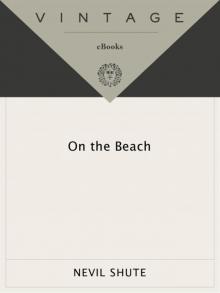 On the Beach
On the Beach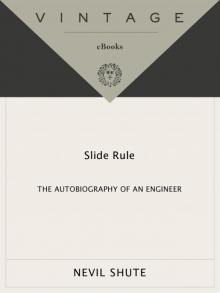 Slide Rule
Slide Rule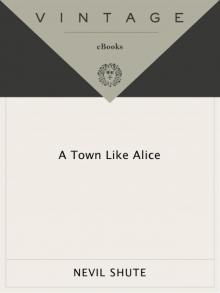 A Town Like Alice
A Town Like Alice The Far Country
The Far Country Pied Piper
Pied Piper Round the Bend
Round the Bend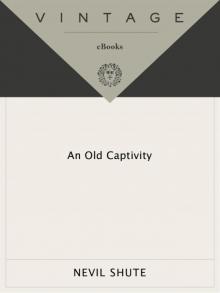 An Old Captivity
An Old Captivity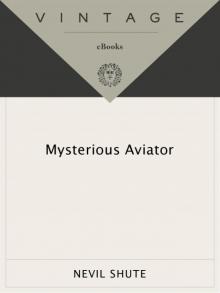 Mysterious Aviator
Mysterious Aviator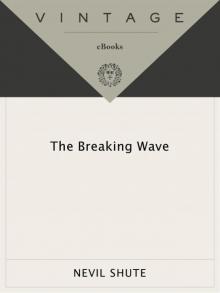 The Breaking Wave
The Breaking Wave Marazan
Marazan Lonely Road
Lonely Road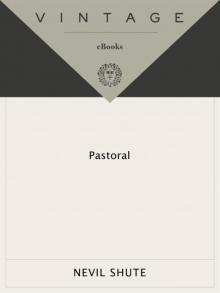 Pastoral
Pastoral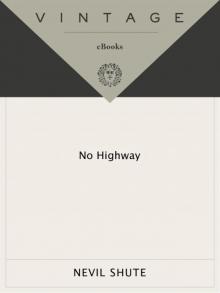 No Highway
No Highway Stephen Morris and Pilotage
Stephen Morris and Pilotage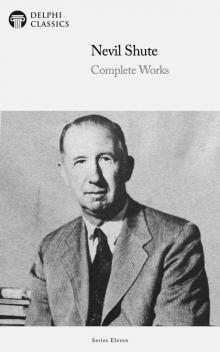 Complete Works of Nevil Shute
Complete Works of Nevil Shute Most Secret
Most Secret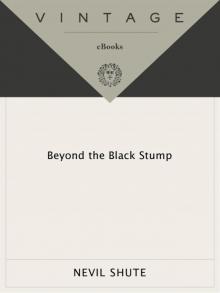 Beyond the Black Stump
Beyond the Black Stump The Rainbow and the Rose
The Rainbow and the Rose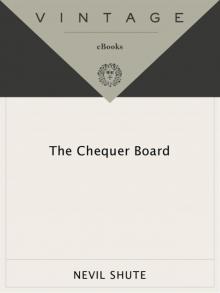 The Chequer Board
The Chequer Board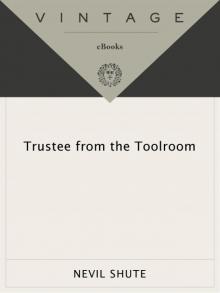 Trustee From the Toolroom
Trustee From the Toolroom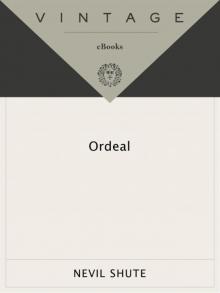 Ordeal
Ordeal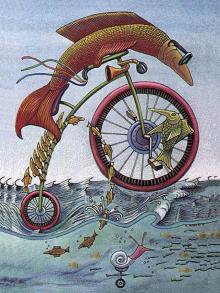 Stephen Morris
Stephen Morris